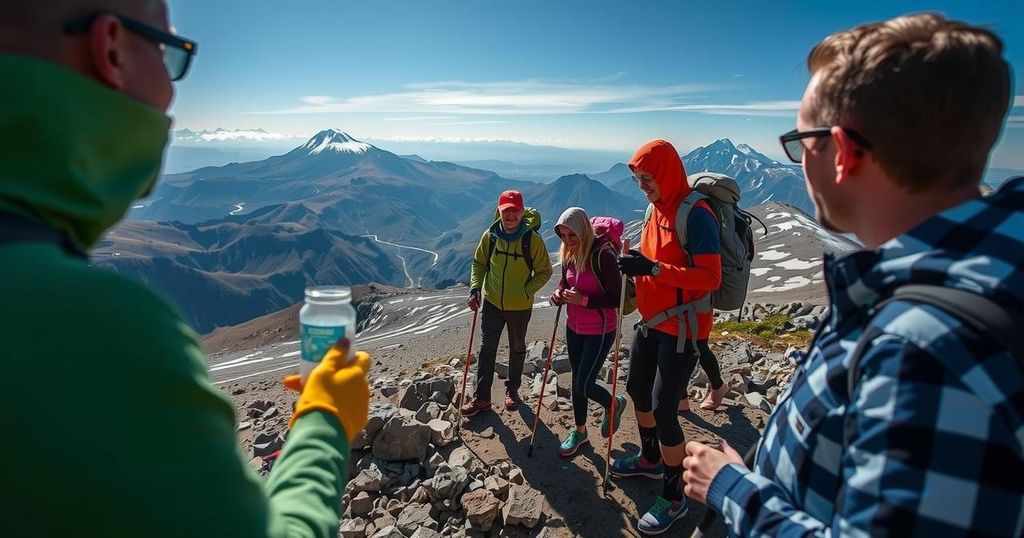A group of UNM alumni climbed Ecuador’s tallest peaks to advocate for enhanced accessibility to prosthetic care for individuals with limb loss. Their expedition, aligned with the Range of Motion Project’s mission, aimed to raise funds and awareness for this pressing issue, illustrating the disparity in healthcare services for the disabled community. The initiative successfully raised over $350,000, highlighting the importance of mobility as a fundamental human right.
In October, four alumni from the University of New Mexico (UNM) undertook a significant expedition to some of the highest peaks in Ecuador to promote accessibility to prosthetic care. Kyle Stepp, Sean O’Neill, and Jacob Fox ascended Cayambe, a glacier-covered volcano reaching nearly 19,000 feet, while Allison Gordon climbed Chimborazo, standing over 20,000 feet. Their joint effort aims to advocate for mobility as a fundamental human right, especially for individuals with limb loss. Stepp emphasized, “We all have four very different careers and backgrounds, but we believe mobility is a human right and should be accessible to everybody.” The mission aligns with the ongoing efforts of the Range of Motion Project (ROMP), a non-profit organization dedicated to increasing accessibility of prosthetic care in underserved regions of Latin America. As studies indicate, approximately only 10% of individuals requiring assistive devices like prostheses can access them due to various factors including cost and lack of public awareness. Elevating this issue, Stepp remarked that this campaign highlights the disparities in prosthetic care available in Ecuador and the urgency for reform. This year marked the tenth anniversary of ROMP’s fundraising hikes, with three teams targeting the country’s highest summits. While adverse conditions limited the progress of Stepp’s team to 17,000 feet, the experience underscored the importance of mobility, as reflected in the joy of those receiving prosthetic limbs, showing their renewed ability to walk and run. The teams collectively raised over $350,000, with a significant tally nearing $1 million achieved over the past decade. Kyle Stepp, a UNM graduate, noted his personal journey after suffering from osteosarcoma as a teenager. Following extensive treatments and a subsequent amputation, Stepp grew acutely aware of the challenges faced by amputees seeking prosthetics. He noted, “Having to fight for access to the proper prosthetic device I needed just to go to work…was half the battle.” In response to these barriers, Stepp has co-founded the advocacy initiative “So Every BODY Can Move,” aimed at mandating insurance coverage for prosthetics needed to enhance the quality of life. His efforts have resulted in significant legislative changes across multiple states in a short span of time. In pursuit of athletic excellence, Stepp recently competed at the triathlon World Championships representing Team USA and is on a trajectory to partake in the upcoming 2028 Paralympic Games in Los Angeles.
The article highlights the efforts of UNM alumni who climbed Ecuador’s tallest peaks to raise awareness of prosthetic accessibility, a critical issue facing many individuals with limb loss. This initiative is linked to broader efforts by ROMP, which seeks to provide quality prosthetic care in the region. The context involves a stark reality where a mere fraction of those in need can obtain essential mobility aids, emphasizing the gap in healthcare services for disabled individuals. At the heart of this mission is a commitment to shed light on the humanitarian aspect of mobility and the transformative impact of prosthetic access.
In conclusion, the climb undertaken by UNM alumni not only showcased their adventurous spirit but also their commitment to advocating for the rights of individuals with limb loss. Through their efforts and the support of ROMP, awareness is being raised to address the systemic issues surrounding prosthetic care in Latin America. Their advocacy, alongside personal narratives of resilience, underscores the necessity of ensuring that mobility is recognized as a basic human right. Collectively, they aim to foster change that enhances the quality of life for individuals with disabilities everywhere. As the initiative gains momentum, it offers a hopeful perspective towards a future where access to mobility is equitable and universally acknowledged as critical to human dignity.
Original Source: news.unm.edu






